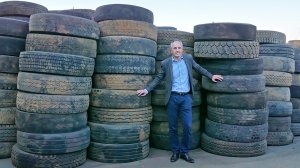Firm emphasises valorisation

Mathe Group CEO Dr. Mehran Zarrebini discussing the current state of rubber manufacturing and recycling in Africa. Recording: Lumkile Nkomfe. Editing: Shadwyn Dickinson. Recorded 26-01-2024
To advance circularity and sustainability in the rubber manufacturing industry, leading rubber crumb manufacturer Mathe Group emphasises a strong focus on valorising waste rubber as a means of increasing supply amid increased demand.
Rubber crumb is used on roads and artificial sporting fields, and in gyms and high-rise buildings, in addition to more traditional uses such as in the manufacture of new car tyres.
“If you’re able to valorise a product within your group . . . [and sell it] to external customers, you’re able to move away from the bullwhip effect of demand variabilities,” says Mathe Group CEO Dr Mehran Zarrebini in addressing the important aspects of tyre recycling.
One can also constantly sell products locally and to external customers, and “ride out any kind of problems that may arise with demand in the future”, he adds.
Challenges to Entry
He notes that a difficulty in entering the rubber crumb manufacturing industry is the capital funding requirements that require companies to have the necessary supply agreements for raw material and offtake agreements with customers.
A waste management licence is another requirement needed to enter this space, and it takes 12 to 18 months before one is permitted to bring in one’s own equipment to start production.
Entrants also face financing challenges regarding the hiring or buying of equipment, having the necessary infrastructure in place to process tyres and manufacture the end-product, as well as developing the logistical capacity to distribute the product to end-users.
Consequently, Zarrebini suggests that there is a need for the public sector to assist entrepreneurs in resolving these challenges.
He says tyres are a waste problem: “You only have to look at some of the data that the Waste Bureau has put out. It’s 2018 information, but they talk about 300 000 t of waste material available for recycling or repurposing. There is a long way to go in terms of ridding South Africa of its waste problem.”
However, with this potential for the sector to make a greater contribution to the economy, he champions the facilitation of new entrants into the industry, with potential employment opportunities ensuing from substantive investment by the public sector in the industry.
Mathe’s Proposition
Zarrebini cites the Mathe Group – which employs over 200 people, with the majority of its employees hailing from Hammarsdale, in KwaZulu-Natal, where the company operates – as an example of a key employer in a relatively remote area.
Although he notes the low cost of using recycled content, compared with creating virgin material in terms of a circularity perspective, he acknowledges the challenge of breaking tyres down having been intended to be “unbreakable”.
The public should do more to ensure that more recycled material is incorporated into the value chains of various industries, and that more products are manufactured with circularity in mind.
Zarrebini adds that the products that the Mathe Group manufactures are fully recyclable at the end of their life cycle.
He expresses concern at a generalised lack of planning regarding the management of rubber waste and suggests that a proliferation of rubber waste could become an environmental challenge, citing the example of an astroturf hockey field.
“A hockey field normally lasts for eight to ten years and underneath they tend to use this rubber crumb to make an elastic layer. However, what typically happens at the end of that period is that, when the artificial grass is taken away, whether it be donated to another facility or otherwise, the elastic rubber layer at the bottom is left behind. All that most companies do is lift up the material and deposit it at a landfill.”
Mathe can use some of that material to manufacture different moulded products.
“So, in this regard, we have this full circle, where recycled materials are being used to manufacture products at the end of their useful life. I think that’s the kind of thinking that we require going forward, but it also requires a lot of innovation . . .”
Zarrebini also stresses the importance of using energy efficient equipment to break down tyres and enhance the operation of rubber manufacturing plants, while consumers should be cognisant of the great amount of labour and energy required to create a product from rubber crumb.
Article Enquiry
Email Article
Save Article
Feedback
To advertise email advertising@creamermedia.co.za or click here
Press Office
Announcements
What's On
Subscribe to improve your user experience...
Option 1 (equivalent of R125 a month):
Receive a weekly copy of Creamer Media's Engineering News & Mining Weekly magazine
(print copy for those in South Africa and e-magazine for those outside of South Africa)
Receive daily email newsletters
Access to full search results
Access archive of magazine back copies
Access to Projects in Progress
Access to ONE Research Report of your choice in PDF format
Option 2 (equivalent of R375 a month):
All benefits from Option 1
PLUS
Access to Creamer Media's Research Channel Africa for ALL Research Reports, in PDF format, on various industrial and mining sectors
including Electricity; Water; Energy Transition; Hydrogen; Roads, Rail and Ports; Coal; Gold; Platinum; Battery Metals; etc.
Already a subscriber?
Forgotten your password?
Receive weekly copy of Creamer Media's Engineering News & Mining Weekly magazine (print copy for those in South Africa and e-magazine for those outside of South Africa)
➕
Recieve daily email newsletters
➕
Access to full search results
➕
Access archive of magazine back copies
➕
Access to Projects in Progress
➕
Access to ONE Research Report of your choice in PDF format
RESEARCH CHANNEL AFRICA
R4500 (equivalent of R375 a month)
SUBSCRIBEAll benefits from Option 1
➕
Access to Creamer Media's Research Channel Africa for ALL Research Reports on various industrial and mining sectors, in PDF format, including on:
Electricity
➕
Water
➕
Energy Transition
➕
Hydrogen
➕
Roads, Rail and Ports
➕
Coal
➕
Gold
➕
Platinum
➕
Battery Metals
➕
etc.
Receive all benefits from Option 1 or Option 2 delivered to numerous people at your company
➕
Multiple User names and Passwords for simultaneous log-ins
➕
Intranet integration access to all in your organisation


















